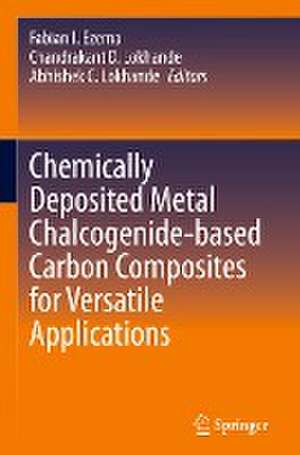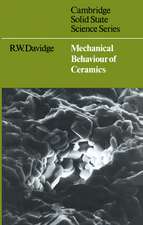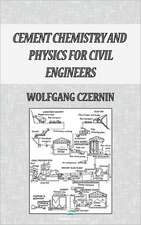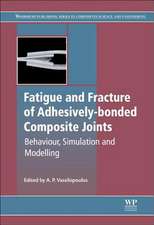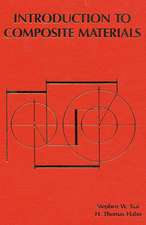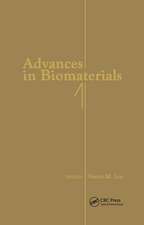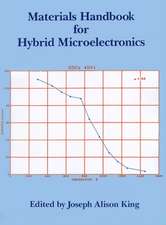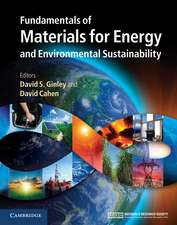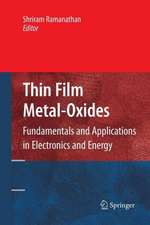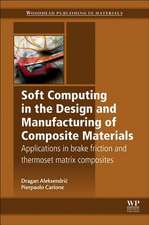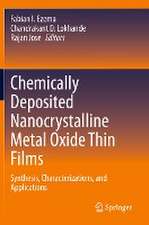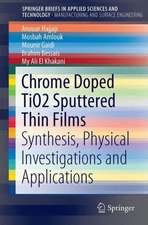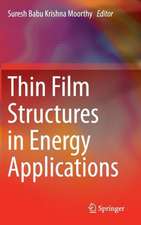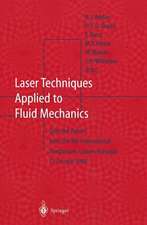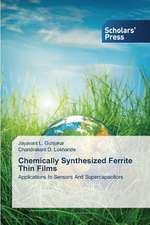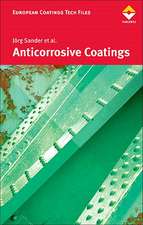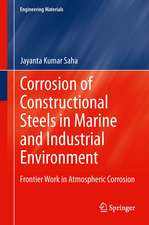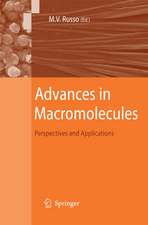Chemically Deposited Metal Chalcogenide-based Carbon Composites for Versatile Applications
Editat de Fabian I. Ezema, Chandrakant D. Lokhande, Abhishek C. Lokhandeen Limba Engleză Hardback – 31 mar 2023
| Toate formatele și edițiile | Preț | Express |
|---|---|---|
| Paperback (1) | 1047.98 lei 38-44 zile | |
| Springer International Publishing – apr 2024 | 1047.98 lei 38-44 zile | |
| Hardback (1) | 1233.06 lei 3-5 săpt. | |
| Springer International Publishing – 31 mar 2023 | 1233.06 lei 3-5 săpt. |
Preț: 1233.06 lei
Preț vechi: 1503.73 lei
-18% Nou
Puncte Express: 1850
Preț estimativ în valută:
235.97€ • 256.23$ • 198.22£
235.97€ • 256.23$ • 198.22£
Carte disponibilă
Livrare economică 02-16 aprilie
Preluare comenzi: 021 569.72.76
Specificații
ISBN-13: 9783031234002
ISBN-10: 3031234006
Pagini: 434
Ilustrații: VIII, 434 p. 211 illus., 183 illus. in color.
Dimensiuni: 155 x 235 mm
Greutate: 0.89 kg
Ediția:2023
Editura: Springer International Publishing
Colecția Springer
Locul publicării:Cham, Switzerland
ISBN-10: 3031234006
Pagini: 434
Ilustrații: VIII, 434 p. 211 illus., 183 illus. in color.
Dimensiuni: 155 x 235 mm
Greutate: 0.89 kg
Ediția:2023
Editura: Springer International Publishing
Colecția Springer
Locul publicării:Cham, Switzerland
Cuprins
Chapter 1. 0D, 1D, 2D and 3D structured chalcogenides for supercapacitor applications.- Chapter 2. 1D, 2D, and 3D structured metal chalcogenides for supercapacitor.- Chapter 3. Chemically deposited Iron Chalcogenides based Carbon composites for Supercapacitor applications.- Chapter 4. Nanostructure design for supercapacitor application.- Chapter 5. Emerging materials for Li-ion capacitor.- Chapter 6. Advances in Fabricating Mn3O4 and its Carbon Composite for Electrochemical Energy.- Chapter 7. Porous Hybrid Electrode Materials for High Energy Density Li-ion and Li-S Batteries.- Chapter 8. Electrode materials for high energy density Li-ion.- Chapter 9. Emerging novel chalcogenide based materials for electro water-splitting.- Chapter 10. Chemical Processing of Cu2SnS3 nanoparticles for printable solar cells.- Chapter 11. Rational engineering of photocathodes for hydrogen production Heterostructure, dye sensitized, perovskite and tandem cells.- Chapter 12. One-Step Solid-State Mechanochemical Synthesis of Metal Chalcogenides as a Perspective Alternative to Traditional Preparation Routes.- Chapter 13. Fundamentals of First-Principles Studies.- Chapter 14. Surface Rare Earth Elements based Non-Enzymatic Glucose Sensor.- Chapter 15. Surface functionalized Iron Oxide (Fe3O4) Nanoparticles for Biomedical Applications.
Notă biografică
Fabian I. Ezema is a Professor at the University of Nigeria, Nsukka. He obtained a PhD and MSc in Physics and Astronomy from the University of Nigeria, Nsukka, and a BSc from the then Anambra State University of Science and Technology, Enugu. His researches are on several areas of Materials Science: synthesis and characterizations of particles and thin films materials through chemical routes with emphasis on energy applications. He is interested in materials for thin film solar cells fabrication and nanoparticle synthesis. For the last 15 years, he has been working on the nano/submicron-sized materials for energy conversion and storage (cathodes, anodes, supercapacitors, thin film solar cells, DSSC, etc.), including novel methods of synthesis, characterization, and evaluation of the electrochemical and optical properties. He was a CV Raman Fellow at the Shivaji University, Kolhapur, India, in 2011 and MIF Fellow at Tokyo University of Science, Japan, in 2013. He is avisiting professor to NRSEMT (MATECSS UNESCO Chair) in Varennes, Quebec, Canada, and iThemba Labs, South Africa. He is also a Fellow of UNESCO-UNISA South Africa Chair in Nanosciences and Nanotechnology (U2ACN2). He was awarded the University of South Africa (UNISA) visiting researcher program (VRP). Fabian is a senate representative to National Center for Energy Research and Development (NCERD), University of Nigeria, and due to his commitment to research and international visibility was appointed Pioneer Acting Director, International Office of the University of Nigeria after the approval of the office by the University Senate. He has served as Coordinator, Natural Science Unit, School of General Studies, UNN. He is the Coordinator of Nano Research Group, University of Nigeria, Nsukka. He is the pioneer Dean, Faculty of Natural and Applied Sciences, Coal City University Enugu, Nigeria. Fabian has published over 180 high-impact papers in various national and international journals and gave over 50 talks at various conferences, workshops, and seminars. His h-index is 37, i10 index of 141 with over 4800 citations as in google scholar.
Chandrakant D. Lokhande is presently working as a Dean and Research Director at D Y Patil Education Society (Deemed to be University), Kolhapur, India. He has been working on several areas of thin film technology, ranging from chemical synthesis of thin films to their applications in solar cells, gas sensors, and supercapacitors. Moreover, he made a great contribution to designing several prototype devices such as supercapacitors and heterojunction-based room temperature gas sensors. He received his Ph.D. from Shivaji University, Kolhapur, in 1984, without viva voce examination as his thesis was adjudged as “Excellent.” Later, in 1987, he joined as an assistant professor in Physics and became professor and Head at Shivaji University, Kolhapur, immediately after accomplishing his first postdoctoral stay atthe Weizmann Institute of Science, Israel. He has won many awards and received many honors. He was appointed as Fellow of the Institute of Physics, London, in 1990; was visiting scientist in the Indo-Polish CEP scheme in 1991; was INSA Visiting Fellow in 1993; is the first recipient from Shivaji University of the prestigious Alexander von Humboldt Fellowship, Germany, in 1996 and Brain Pool fellowship of South Korea in 2003; was participant in Noble Laureates Meeting, Lindau, Germany, in 2001; was visiting professor at Hanyang University, South Korea, in 2006; was awarded a Rajya Shishak Purshakar, Government of Maharashtra State in 2009, and Best Teacher Award from Shivaji University in 2010. He is presently an editorial board member of Electrochemical Energy Technology, De Gruyter; the fellow, Maharashtra Academy of Sciences from 2012; an expert member, and a distinguished visiting professor in polymer chemistry, Institute of Chemical Technology, Mumbai, from 2012. He is the author of more than 650 papers in international journals with “h” index 97 and more than 35,200 citations, edited 11 books, fled more than 50 patents, and directed more than 65 PhD theses. Recently, he has been listed at first position in top 2% scientists in the subject of Applied Physics in India by a Stanford University Survey
Abhishek Lokhande is currently working as a Researcher at the Khalifa University of Science and Technology, Abu Dhabi, United Arab Emirates (UAE). He obtained his Ph.D. degree in 2019 in Materials Science and Engineering from Chonnam National University, South Korea. Before that, he obtained his Bachelor's (2012) and Master's degree (2014) in Mechanical Engineering from Shivaji University, India. His research interests include the synthesis, characterization, and development of novel efficient metal chalcogenide nanomaterials/thin films for thin film solar cells, gas sensors, and energy storage/energy conversion systems. He has published over 100 research papers and his h-index is 34, i10 index of 85 with4000 citations as in google scholar.
Chandrakant D. Lokhande is presently working as a Dean and Research Director at D Y Patil Education Society (Deemed to be University), Kolhapur, India. He has been working on several areas of thin film technology, ranging from chemical synthesis of thin films to their applications in solar cells, gas sensors, and supercapacitors. Moreover, he made a great contribution to designing several prototype devices such as supercapacitors and heterojunction-based room temperature gas sensors. He received his Ph.D. from Shivaji University, Kolhapur, in 1984, without viva voce examination as his thesis was adjudged as “Excellent.” Later, in 1987, he joined as an assistant professor in Physics and became professor and Head at Shivaji University, Kolhapur, immediately after accomplishing his first postdoctoral stay atthe Weizmann Institute of Science, Israel. He has won many awards and received many honors. He was appointed as Fellow of the Institute of Physics, London, in 1990; was visiting scientist in the Indo-Polish CEP scheme in 1991; was INSA Visiting Fellow in 1993; is the first recipient from Shivaji University of the prestigious Alexander von Humboldt Fellowship, Germany, in 1996 and Brain Pool fellowship of South Korea in 2003; was participant in Noble Laureates Meeting, Lindau, Germany, in 2001; was visiting professor at Hanyang University, South Korea, in 2006; was awarded a Rajya Shishak Purshakar, Government of Maharashtra State in 2009, and Best Teacher Award from Shivaji University in 2010. He is presently an editorial board member of Electrochemical Energy Technology, De Gruyter; the fellow, Maharashtra Academy of Sciences from 2012; an expert member, and a distinguished visiting professor in polymer chemistry, Institute of Chemical Technology, Mumbai, from 2012. He is the author of more than 650 papers in international journals with “h” index 97 and more than 35,200 citations, edited 11 books, fled more than 50 patents, and directed more than 65 PhD theses. Recently, he has been listed at first position in top 2% scientists in the subject of Applied Physics in India by a Stanford University Survey
Abhishek Lokhande is currently working as a Researcher at the Khalifa University of Science and Technology, Abu Dhabi, United Arab Emirates (UAE). He obtained his Ph.D. degree in 2019 in Materials Science and Engineering from Chonnam National University, South Korea. Before that, he obtained his Bachelor's (2012) and Master's degree (2014) in Mechanical Engineering from Shivaji University, India. His research interests include the synthesis, characterization, and development of novel efficient metal chalcogenide nanomaterials/thin films for thin film solar cells, gas sensors, and energy storage/energy conversion systems. He has published over 100 research papers and his h-index is 34, i10 index of 85 with4000 citations as in google scholar.
Textul de pe ultima copertă
This book satisfies the interest and curiosity of beginners in thin film electrode preparations, characterizations, and device making, while providing insight into the area for experts. The considerable literature on ‘metal chalcogenides based carbon composites and their versatile applications’ reflect its importance for research and demonstrate how it’s now reached a level where the timely review is necessary to understand the current progress and recent trends and future opportunities. In the book, the authors examine recent advances in the state-of-the-art fabrication techniques of metal sulfide based carbon composites along with their working mechanisms, associated issues/solutions, and possible future are discussed. In addition, detailed insight into the properties and various applications including principles, design, fabrication, and engineering aspects are further discussed.
- Provides a detailed and simplified fabrication routes of thin film electrode preparation with informative images;
- Discusses structural, optical, morphological, electrical, and other properties of metal chalcogenide carbon composites;
- Illustrates state of the art applications of the metal chalcogenides based carbon composites.
Caracteristici
Provides a detailed and simplified fabrication routes of thin film electrode preparation with informative images Discusses structural, optical, morphological, electrical, and other properties of metal chalcogenide carbon composites Illustrates state of the art applications of the metal chalcogenides based carbon composites
